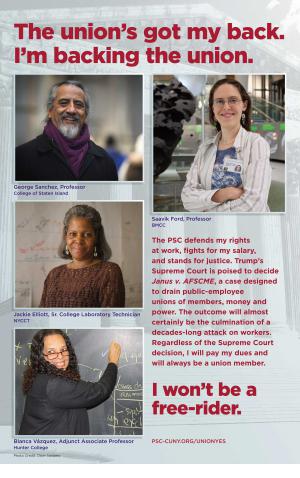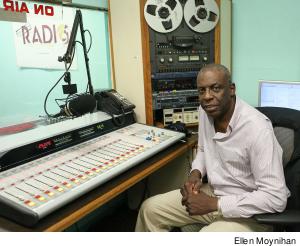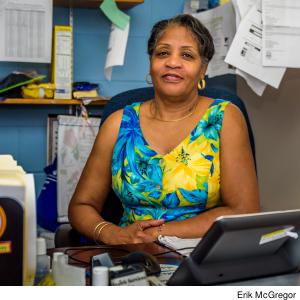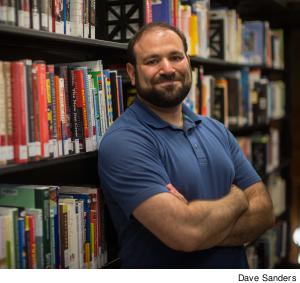The Supreme Court is considering hearing the federal lawsuit Janus v. AFSCME. With Neil Gorsuch confirmed as the justice to fill Antonin Scalia’s seat, the 5-4 conservative majority has been restored, and there’s little reason to think any of the five conservative justices will discover their inner unionist when confronted with this case. (Preparing for the possible new regime, the PSC has launched a recommitment campaign.)
 |
The case seeks to do what other anti-union lawsuits are also pursuing – to overturn a four-decade precedent that public-sector unions may charge nonmembers in their bargaining units an agency shop fee for the services and representation the union provides them.
A loss for the American Federation of State, County and Municipal Employees (AFSCME), one of the largest national public-sector unions in the country, in the high court would mean an end to the agency shop system and a likely decline in revenues for unions as fee payments end and some workers stop paying dues. These revenues are what fund union services, including bargaining power, legal representation and much more. The union victories that save jobs, stop budget cuts, secure back pay, fix health and safety problems and advocate for public higher education in the political arena are all the result of hard work by the union, built with unions dues. Organized capital is aiming to stem that revenue stream in order to destroy labor’s power.
RECOMMITMENT CAMPAIGN
The good news is that PSC members are preparing for this new regime. Through the recommitment campaign, rank-and-file members are reaching out to their colleagues through one-on-one conversations to urge them to recommit to staying dues-paying union members.
More than 3,000 members have already signed red recommitment cards, declaring that they won’t become “free riders,” people who benefit from union gains but who do not pay dues. At campuses across CUNY, members are having conversations about the future of the union and how people can commit to remaining invested in the union so that it continues to be strong.
Members are off to an encouraging start, but this is just the beginning. As the months wind on, this kind of energy will put the PSC in a position to retain its power regardless of what the Supreme Court does.
Organizers and chapter chairs have held trainings for members on how to engage other members about the recommitment campaign and how to best educate members on the possible Supreme Court case and how the union dues structure builds the power of the union. While many campuses are at their quietest over the summer, this is a vital time for year-round employees – especially higher education officers, college laboratory technicians and library faculty and staff – to conduct outreach and organize to build momentum for an even bigger adhesion and recommitment push when the Fall semester starts.
What follows are a few success stories from around the university that outline how rank-and-file members are building power in the face of this daunting challenge.
Anthony Parrella
Administrative Coordinator
Accelerated Study in Associate Programs (ASAP)
Bronx Community College
I’m making the one-on-one conversations really personal. I don’t send emails or do phone calls. If I notice a staff member on a break, then I’ll approach them. I’ll basically give them a lot of information. I won’t just say, “Oh, here’s a card. Please sign it.” I spend a good 15 minutes with each staff member, telling them of the importance of the Neil Gorsuch confirmation and what it means for us moving forward. I tell members how important it is for us to continue to pay dues so we can maintain our bargaining power.
If we maintain our bargaining power, they can’t really hurt us. Everyone on my team has been really enthusiastic about committing to the union. They do understand that without any money, the PSC can’t continue to win raises, good health care, a pension. They get it.
I come from a family of union workers. I didn’t grow up really wealthy but I grew up in a middle class household. I was able to get braces. I was able to go to the doctor and the dentist. My parents were able to retire. We lived in a house. These were things that the union fights for.
The facts are, if it wasn’t for unions – would there even be pensions and 401(k)s? Would I be blessed to be paying $1 every paycheck for health care? I really don’t think so. I feel very lucky to have the job that I have.
Alexandra Lewis
Graduate Music Performance Advisor and Lecturer
Brooklyn College
When I’m able to approach people face-to-face, everyone has been more than willing to hand in those cards. I would say that the support for the union now is stronger than ever, given the Trump administration and the attacks coming from every direction every day. People are very aware of how important it is. I don’t have to do any arm twisting. The final pay increase, which was a long time coming, was proof that union power works.
There was one adjunct who voiced her concern about some union benefits. She said, she’d turn in her card later. She’s an anomaly. Another adjunct whom I talked to told me it was her goal to get all the adjuncts in her department to sign cards. The full-time faculty are like, “Yeah!” I think it’s a good opportunity just to have a face-to-face conversation with people just to remind them of the importance of the union. I’ve collected at least 20 cards in a couple of weeks. I’ll keep going until I get to everybody I can.
Musicians know the importance of union strength because of the musicians’ union. The plight of a musician is notorious for exploitation; they’re constantly underappreciated and undervalued. A union gives them some kind of protection. I don’t know if that played in to the fact that most of them signed cards without hesitation.
Fitz Richardson
College Laboratory Technician
Department of Television
and Radio
Medgar Evers College
My father always says, “A good preacher is the one who makes people do the right thing for themselves.” So if you preach the right words to union members, they’ll understand why the recommitment campaign is very important. You have to stress what a union stands for, and you have to make them feel it. You have to tell stories about our gains. You don’t have to shout or scream, you just have to tell the truth. Like a good preacher does, he gets up and says, “amen” and “hallelujah.”
 |
PSC President Barbara Bowen came and spoke to our campus this Spring semester. She spoke about the importance of staying together – which I always knew. It was nothing new to me because I’ve been to several marches and other actions. During that meeting, I collected some blank cards and I began to talk to my CLT members. So far, I have gotten 100 percent signatures. I call it on the positive note.
Everybody took the bonus and back pay. So when I talk to my colleagues, I tell them that they’re part of the union. Nobody said “no.” Nobody said, “I don’t want no benefits, no dental; I don’t want no health care.” I tell them about the gains the union got them despite the obstacles. You got people who got arrested, you have people who marched, you have people who woke up at four in the morning to go to Albany, you got people doing a whole lot of things, while basically, the only thing you got to do is sign a paper. I tell them, “You ate the steak, you pay for the meal.”
Sharon Hawkins
Higher Education Assistant
Health Services
York College
I’ve been having conversations, taking the cards the union has provided and sharing with the members that we need to stand as a strong body because of the Supreme Court’s possible decision that would state that we don’t have to be paying members, but can use the benefit of the union, which would eventually dismantle the union.
 |
When I’ve talked to the people, they’ve all been on board. I have not had any adversity with anyone. They get it, they understand it. They know that we need the union to negotiate our contract and our rights.
I think a lot of members are not aware of the Supreme Court case, so that message might need to be shared more broadly, as well as the understanding behind the consequences. If we have people who are not going to be participating as paying members, but yet want to use a service, its not fair, because if you’re not going to pay, then why should you get to have the union represent you? Because all of this takes money.
For me, personally, it’s self-evident why the union is important, we wouldn’t have had the contract that we received, to get the benefits we’ve been able to get.
Carrie Conners
Associate Professor
English Department
LaGuardia Community College
The process of talking to my fellow union brethren about recommitting to the union has been a positive and rewarding one. So far, I’ve mainly spoken to members of my department, colleagues whom I know well and newly hired members whom I am just getting to know. In our conversations, people have had questions about Janus v. AFSCME and how it poses threats to our union. We’ve spoken about how our union dues are used and why they are integral to our union’s strength and ability to support contract negotiations.
Faculty members have expressed their feelings about our current contract, mainly positive, and their hopes for the next one after the current one expires this fall. Full-time faculty members are eager to receive a course reduction in the new contract, something essential to serve our students well and to add sorely needed balance to our lives. Several colleagues worry that a weakened union might not have the resources needed to secure that reduction.
It’s been heartening to hear members’ commitment to the union. One colleague penned exclamation points on the recommitment card after the sentence, “Now more than ever, I’m sticking to the union.” Responses like that give me hope that our union will be resilient despite external attempts to weaken it.
David Unger
Coordinator
Labor Relations Certificate Programs
Murphy Institute, School for Professional Studies
We have had a bunch of conversations and meetings about it, and we say to people, “How does this case impact the things you care about?”
 |
I can then talk about how the right is attacking the power that we have collectively to get things done. That’s a real thing. You care about students? You care about CUNY’s ability to service its community? You care about your own wages and working conditions? Janus is an attack on our ability to defend our students. How? By making our collective power weaker.
I think we can powerfully state: if you care about education budgets, then, well, in the past decade us working collectively in our organization has been the only backstop to CUNY budgets getting cut. You care about your ability to get wages? It always has to start from the interest of the audience, not the interest of the organization.
Amy Jeu
College Laboratory Technician
Department of Geography
Hunter College
There has been an overwhelmingly positive turnout to sign the recommitment cards. CLTs on each campus are seeking out fellow CLTs, surveying them and talking about the union and contract demands. We genuinely want to hear from CLTs about their reservations, concerns and needs. Our approach is very simple: meeting people wherever they’re at, being quick to listen and slow to speak, learning of their needs and empowering them to be more proactive. One of the biggest challenges is overcoming their perception of the union and realizing the untapped power CLTs possess.
We are moving people from a position that the union is something we get goodies from to we are the union because the union is comprised of everyone within the organization coming together. It’s also helping people to understand that if we want something or want to see change in a particular area, we CLTs need to fight for it, be heard and be persistent. CUNY doesn’t give us anything for free; all that we and other groups have gained has been achieved through hard work, organizing, research, campaigning and fighting for what we believe in. We CLTs must do the same moving forward.
Kristina Baines
Assistant Professor
Anthropology
Guttman Community College
Here at Guttman, we are a small faculty and we all know each other. After my experience leading a union campaign as my project for the union leadership training I just finished, I am well recognized and trusted, it seems, and all the faculty members I have asked to sign were very quick to do it without really needing to enter a discussion. We have a strong union commitment here at Guttman, especially among faculty, which I think has a lot to do with our curriculum and its focus on social justice. Our interdisciplinary lends itself to solidarity as well.
Robert Farrell
Associate Professor, Coordinator
Information Literacy and Assessment
PSC Chapter Chair
Lehman College
Recommitting to the union is a no-brainer once you realize how our collective strength benefits us all. Our goal at Lehman is to increase the visibility of the union’s presence on campus and to help educate members about our union-won rights and benefits – rights and benefits none of us would have if we pushed for them alone. We’re holding frequent meetings and have begun to train a core group of faculty and staff who will talk with colleagues about what we’ve won in the past and what we can lose going forward under this new Supreme Court.
Additionally, we’re creating new ways for faculty and staff to get directly involved in the work of the union. For example, over the past year, our chapter formed a Social Justice Committee. That committee, in collaboration with students, organized a post-election speak out, a teach-in on changing government, and a town hall on social activism that attracted over 400 students, faculty and staff. Connecting our members with opportunities for creative and engaged action makes real the truth that we – each one of us together – truly are the union.

